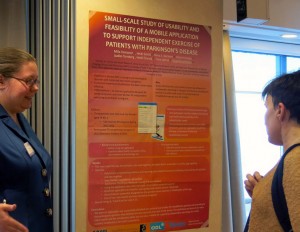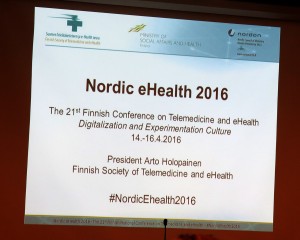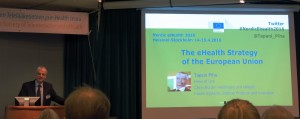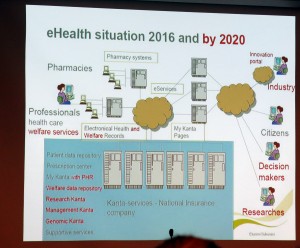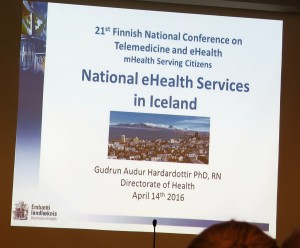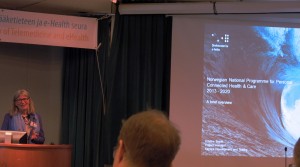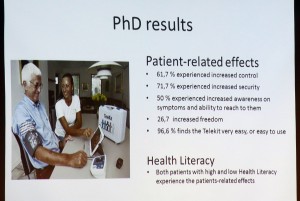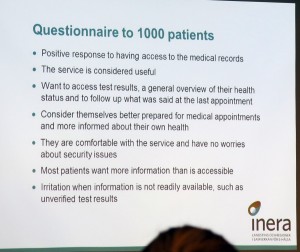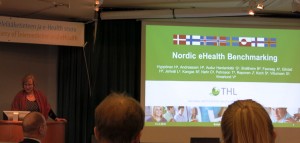I have been working as a researcher in multidisciplinary GASEL study (http://www.oulu.fi/gasel/gasel) funded by Tekes in 2014-2016. The project is ending and its final seminar was organized at 9th Feb 2016 in Oulu, Finland. The topic was eServices for healthy ageing.
In the beginning of the seminar the vice leader of GASEL Timo Jämsä and responsible leader Raija Korpelainen introduced the GASEL project and also other research activities among older people in Oulu. At GASEL, information on e.g., special needs of older people and aspects relating to their health have been mapped from existing knowledge (collected at http://www.oulu.fi/gasel/esiselvitys) and by a population-based questionnaire survey. The questionnaire was posted to 1500 people aged 65 or more, living in Oulu area and being home dwellers. The return rate was 61 percent (n=918).
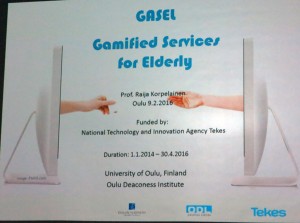
The questionnaire included questions relating to attitudes towards health information, health information literacy, personality, life satisfaction, use of exercise technology, fracture and fall history, medications, sleep, social environment, nature relationship, use of information technology, gaming etc. One important issue was physical activity. It is generally known that physical activity has positive effect on health, wellness, ability for independent living, and physical functioning.
At the seminar, project manager Maarit Kangas told us about factors and actors associated with wellbeing of senior citizens. For example, 50 percent of the survey respondents stated that they were moving around more than 2 h/day. From them 45 percent stated being in at least good health and 79 percent stated feeling happy or quite happy.
Researcher Niina Keränen spoke about ICT use and gaming of older people. According to the GASEL survey seniors play games, including digital games. Stigma against gaming in older age was not a major issue for the seniors of GASEL study.
Researcher Milla Immonen shared preliminary results relating to falls and nutrition. Falls are a major problem in western societies and the reasons behind falls are multifactorial. Nutrition is not commonly taken into account in fall prevention (e.g., in interventions), even though naturally nutrition (e.g., malnutrition) affects our wellbeing. However, according to the results of GASEL study there is a clear connection between falls and nutrition.
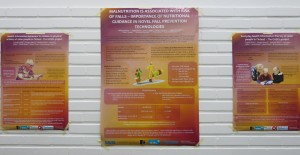
Posters presenting results from GASEL study
GASEL is a funded by Tekes and therefore erterprises are involved. At the seminar researcher Heidi Similä told about the participatory testing of enterprises products and services. Testing had been done by conducting workshops, focus group evaluation, testing events and expert evaluation. By the means of testing, information about the target groups’ needs and attitudes towards technology, and about issues related to usability and acceptability of new technologies has been collected.
At the seminar my presentation focused on how tailoring can be used in eHealth services and on what kind of results were found in GASEL survey relating to older people´s health information behaviour and attitudes towards health information. Information content of eHealth services and also interface and elements of service can be tailored. Through (computer) tailoring different kind of individuals are provided with different kind of content or elements. E.g., person´s health information literacy level, measured with a short questionaire while logging to the eHealth service, could be used as a basis for tailoring. It would impact on what kind of information, and in what form, would the service provide to the person. The preliminary result of GASEL survey indicate, for example, that men are more likely to consider that health related stories and articles are too long and that Individuals in the oldest age group (80 years or older) are most likely to avoid thinking about exercise.
We had a privilege to hear also two presentations from the collaborators of GASEL study. Professor Lars Nyberg and Margareta Lilja from Luleå University of Technology, Sweden, gave a presentation titled ”Active and safe in old age: postural control and home and social environment issues”. And we ended with a presentation by Mika Luimula from Turku University of Applied Sciences. He told us about their interesting Tekes-funded Gamified Solutions in Healthcare –project.
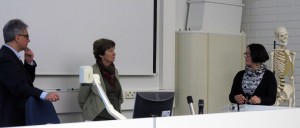
Lars Nyberg, Margareta Lilja and Raija Korpelainen
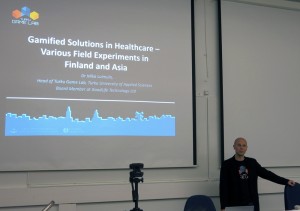
Mika Luimula
HIBA continues the work done in GASEL study focusing on users of eHealth services from the viewpoint of Information Studies.
Blog post by Heidi Enwald, researcher in GASEL study and in HIBA project.
